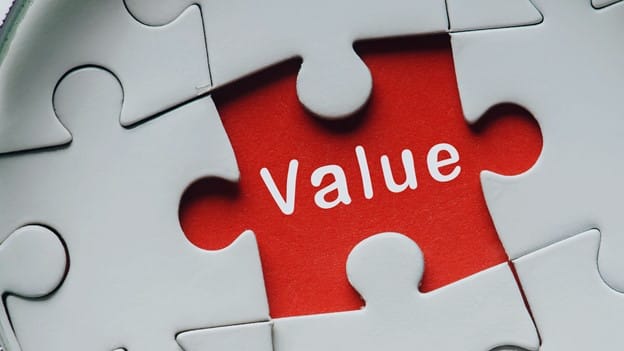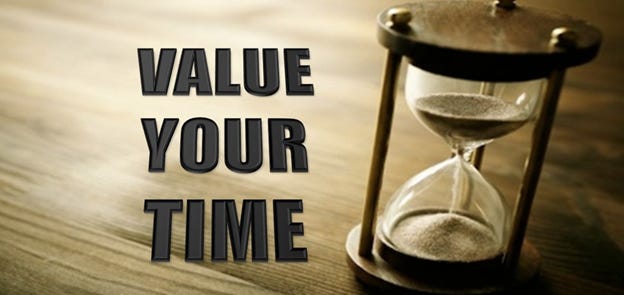Value
Time is the Most Valuable Resource

What is value? The Merriam-Webster dictionary's 4th definition of the word is something (such as a principle or quality) intrinsically valuable or desirable.
When I think of that word, I don't necessarily always consider money or financial value. Nor do I always consider morals or ethics when I think of value. That isn't to say that I never consider those things because I certainly do. However, for this newsletter, I wish to dwell on value as it relates to time and how we spend it concerning value.
I believe that time is our most valuable resource in the world. It isn't money, because we can always earn more. It isn't things, because we can still produce or buy more. Time, however, is something we cannot get more of no matter what we do. We have a finite amount of time in our lives, and how we choose to spend that time is entirely up to us. We can waste it away, or we can do something productive with it. Most of us, if not all of us, end up doing something in between losing it or being productive. It's human nature to be that way. The defining characteristic in each of us is how far the needle is toward production or waste of our time.
When we give our time to someone else, such as for work, we expect compensation for our time given, usually in the form of being paid. Getting paid appropriately is the value we gain for handing over our time to someone else for doing a job. Since we cannot get that time back, we hope and expect to be paid fairly for that time; otherwise, we aren't getting the value out of the arrangement.
What I want to focus on is the value we give ourselves in our lives, and especially in our free time - our off-duty time.
In contemporary times such as these, it is effortless to piddle away our time needlessly on things that give us little to no value in our lives. Essentially it is wasting the time we have so precious little to use. For each person, it is up to them what they consider valuable with what they choose to do with their time. No one can tell us what is and is not valuable to us; only we get to decide for ourselves.
Recently, I read a book by Cal Newport called Digital Minimalism, Choosing a Focused Life in a Noisy World. In it, the author talks about the value of our time as it relates to our digital lives - our time spent on technology. Whether that technology is a computer, a cell phone, a tablet, or whatever, he also touches on the psychological aspect of feeding our need for dopamine and instant gratification in seeing something, anything, new and especially as it relates to ourselves. Think of the little red notification icons on our phones or Facebook. Don't you get a tiny thrill when you have that small red icon waiting for you?
When you stop to think about, how often do you go back to your phone or device to see if there is anything new? Is it once an hour? How about once a day? Or is it more like every few minutes for you?
For the brief period, about a year or so, that I was on Facebook, I quickly found that I was checking it frequently to see what if anything was new for me. It was an addiction, just like anything else.
As pointed out in the book, "Addiction is a condition in which a person engages in the use of a substance or in a behavior for which the rewarding effects provide a compelling incentive to repeatedly pursue the behavior despite detrimental consequences."
The American Psychiatric Association, in its publication of the 5th edition of the Diagnostic and Statistical Manual of Mental Disorders (DSM-5), included behavioral addiction as a diagnosable problem. That means that addiction isn't just about substance abuse. It's the abuse of anything that has a compelling incentive to repeat despite adverse consequences.
When I looked at my behavior with Facebook back then, and with the internet in general, I noticed that I was addicted to the little red icons just the same as anyone else. I was repeatedly checking websites and favorite tech-related internet forums for whatever was new and updated. I have spent countless hours at home on my own time aimlessly wandering around my favorite forums, clicking the refresh button to see if there was something new. In retrospect, the negative consequence of my actions in this context was that I was wasting precious time that I can never get back. I wasn't doing anything of real, substantive value for myself.
It didn't take too long for me to realize Facebook was a time-waster as well as a considerable aggravation in my life, and I gave it up, deleting it entirely. However, that didn't end my time-wasting habit of checking in on my other favorite internet forums and news websites. I kept right along with clicking refresh over and over again, day after day.
Over time, say the last ten years since Steve Jobs introduced the iPhone and the smartphone revolution began, the advances in software and instant communications became overwhelming. The constant beeps, boops, and dings began to bother me at all hours of the day and night. Thankfully, the tech companies starting adding Do Not Disturb options with customization settings with which I could tailor down all the distractions.
That helped a lot with my annoyances and frustrations for a long time. But it barely reduced the constant checking of my favorite websites. Slowly and over time, I began to whittle down the continual checking and refreshing, as well as the notifications I was getting. I realized I wasn't getting the appropriate level of value from all of it. I was merely wasting my time and getting next to nothing of useful value out of it.

This book helped me realize, for myself, that I could do better with the limited resource of time that I have. I've logged out of and deleted any truly unnecessary app on the phone. I have it paired down to a few financial apps that I need on occasion, and the telephone and text message apps. Those two are the only ones that now provide me any kind of alert notifications. Those, I find value in since they are the conduit of connection to the dispatch center and my family. Everything else is secondary and doesn't require a constant connection for me, and that includes email.
At home, I've committed myself to reduce the amount of time I spend browsing the internet aimlessly for hours and reaping no valuable benefit from it.
I'm committing to spending my time in more valuable ways, such as reading more books, enjoying more music, and getting back to writing more. Who knows, perhaps I'll finish the book on my experiences in the U.S. Marine Corps finally.
As a side note, I find music highly valuable. Music provides me with pleasure, entertainment as well as emotional well-being, depending on the genre and mood, of course. Plus, I can listen to it over and over again for many years and still get the same level of, if not more, enjoyment out of it. Music is an investment, in my opinion, because the value it brings me has staying power over not only the short term but the long term as well.
I find it essential to invest more in my time for purposes of bringing higher value to me personally as well as professionally. The more time I spend studying - because I enjoy it and it's necessary - the better off I'll be, and hopefully, we as a department can benefit from it as well.
My friendly advice to you is to look at how you spend your time. Realize that you only have a finite amount of time on this planet. Figure out for yourself what you value most in your life. Is it your family? Your kids, your pets, your career? Is it your education? How about spending time with good, honest friends? Is spending a lot of time on your technology of great value to you? Do you need to reduce it or eliminate it? Are you comfortable with the time you spend with it?
What do you value? Are you doing all that you can to maximize the return on how you spend your time and getting all the value you can out of it?




